Archived Water Damage Blog Posts
Water Damage Restoration in Denver, CO
5/9/2024 (Permalink)
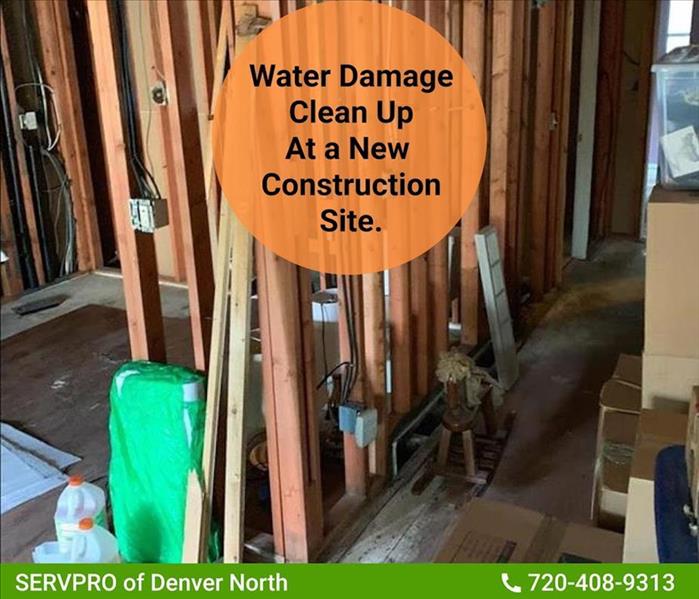 water damage clean up at a construction shite
water damage clean up at a construction shite
Understanding Water Damage Restoration in Denver, CO
Water damage is one of the most common and potentially destructive problems you can face as a homeowner in Denver, CO. From heavy snowfalls in the winter to sudden spring storms, the risk of experiencing water damage is significant. If not taken care of promptly, excess water in your home can promote electrical hazards, cause expensive damage to your home's structure and furnishings, and can even lead to the growth of hazardous mold. Here's what you need to know about water damage restoration in the Mile High City.
What Causes Water Damage?
In Denver, water damage can arise from various sources. The winter season often brings burst pipes due to freezing temperatures, while spring ushers in the risk of basement flooding due to rapid snowmelt and heavy rains. Other common causes include leaky roofs, plumbing leaks, and issues with the foundation or gutter system.
Immediate Steps to Take
- Safety First: Always prioritize safety. Be wary of electrical and "slip and fall" hazards.
- Stop the Water Source: If possible, stop the water at its source to prevent further damage.
- Contact Professionals: Quickly contact a water damage restoration company in Denver. Look for certified professionals with experience in water removal, drying, and mold prevention.
Professional Water Damage Restoration Process
A reputable Denver water damage restoration service will typically follow a structured process:
- Assessment: Technicians will assess the damage using specialized tools to determine the extent of moisture damage and outline an effective plan of action.
- Water Removal: Powerful pumps and vacuums are used to remove water from the property.
- Drying: After water removal, drying and dehumidification begin to prevent mold growth.
- Cleaning: All personal possessions and any parts of the home affected by water will be cleaned.
- Restoration: The final step is restoring your home to its original condition. This could involve minor repairs like replacing a few panels of drywall, or it could entail major renovations, like reconstructing entire rooms.
Why You Need Professionals
Water damage restoration is more complex than simply drying an area with a towel or a regular fan. Without the proper equipment and expertise, hidden moisture can cause irreversible damage and mold growth. Professionals in Denver are equipped with the tools and knowledge necessary to thoroughly remove moisture and protect your home from further damage.
Preventing Future Water Damage
- Regular Maintenance: Regularly check and maintain your home’s plumbing systems, appliances, roofs, and windows to detect potential problems early.
- Improve Drainage: Ensure your home’s gutters are clean and downspouts direct water away from the foundation.
- Inspect and Upgrade: Consider waterproofing your basement and inspecting your sump pump regularly.
Water damage can strike when you least expect it, especially in a city like Denver where the weather can quickly change. Being prepared and knowing how to respond swiftly can significantly minimize the harmful effects of water damage. Should you find yourself facing a flood or leaks, contacting a professional restoration service quickly is the best course of action to help restore and protect your home effectively.
Evaluate the best water damage restoration company
10/11/2023 (Permalink)
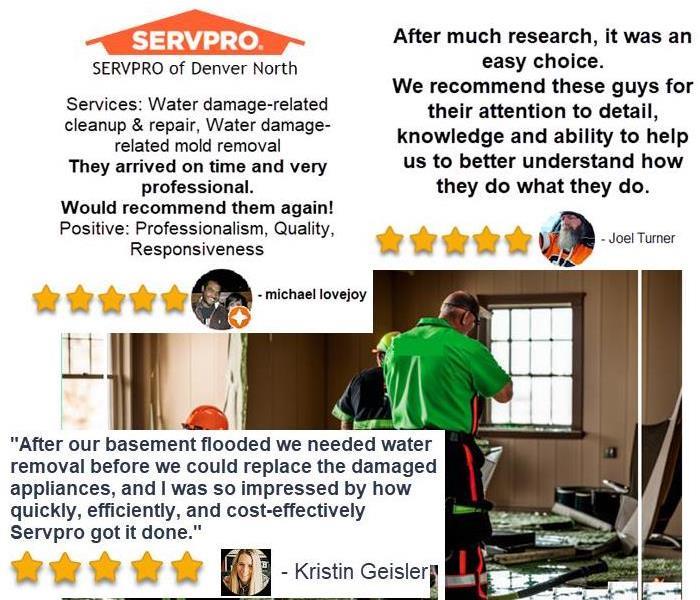 We are just one phone call away
We are just one phone call away
When your evaluating the best water damage restoration company, use or reference the following things:
Experience and Reputation:
Look for a company that has been in the industry for many years and has a good reputation for providing high-quality services.
Availability and Response Time:
You want a company that is available 24/7 and has a fast response time to minimize the damage to their property. Inquire about the company's average response time and emergency services.
Certifications and Training:
Look for a company with certified professionals trained to handle water damage restoration. Ask about the company's certifications and training programs for their staff.
Equipment and Technology:
Look for a company using state-of-the-art equipment and technology to extract water, dry the property, and restore it to pre-damage. Ask about the company's equipment and technology capabilities.
Comprehensive Services:
Find a company that offers comprehensive services, from water extraction to structural repairs and finishing. Ask about the company's services and pricing options.
Insurance Billing:
Find a company that offers direct billing to their insurance company to simplify the claims process. Ask about the company's insurance billing procedures and coverage options.
In summary,
- reference experience and reputation,
- availability and response time,
- certifications and training,
- equipment and technology,
- comprehensive services,
- insurance billing when evaluating the best water damage restoration company.
Call us; we are happy to help and
and we will respond fast...
Voted Best Water Damage Restoration Company Denver North Area Call-Now
5/8/2023 (Permalink)
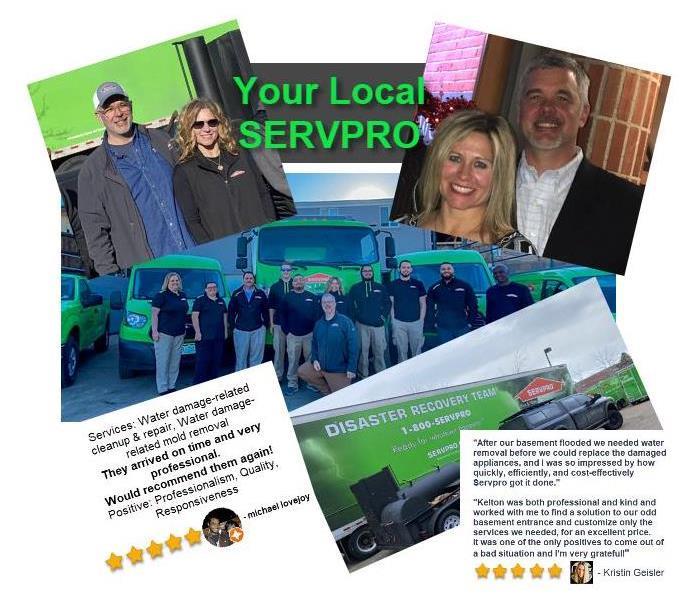 Here To Help
Here To Help
Water damage issues?
We can help you with:
- more resources
- better technology
- deep experience and
- current certifications
Because we are a local company with national resources.
We will mitigate and can repair the damage caused by water in your home or business.
If you have experienced a flood, burst pipe, or other water-related emergency, and you're looking for immediate assistance fast... That's us.
Our goal is to solve your problem and make your experience stress free
OUR COMMITMENT TO YOU
We can be at your location to prevent further damage and help mitigate and restore your property to its preloss condition.
IMMEDIATE DISPATCH TO OUR TECH
Out techs can be dispatched in minutes after your call.
WE CLEAN IT ALL
We are full spectrum cleaning.
We offer a wide range of restoration and cleaning services for residential and commercial properties that have been affected by water, fire, smoke, mold, and other types of damage.
LIST OF SERVICES
- Water damage restoration
- Fire damage restoration
- Mold remediation
- Storm damage restoration
- Cleaning services
(including carpet cleaning, air duct cleaning, and biohazard cleanup)
- Building services
(including reconstruction and remodeling)
- Commercial cleaning services
(including COVID-19 disinfection)
- Document restoration and recovery
24/7 EMERGENCY SERVICES
We also provided emergency services and 24/7 support to help customers deal with unexpected disasters and minimize damage to their property.
INSURANCE SUPPORT
Their team of trained and certified technicians use state-of-the-art equipment and techniques to restore properties quickly and efficiently, and we work with customers and insurance companies to help with a seamless and stress-free restoration process.
Call Now (720) 408-9313
Water Damage Cleanup Denver Co Area
12/2/2022 (Permalink)
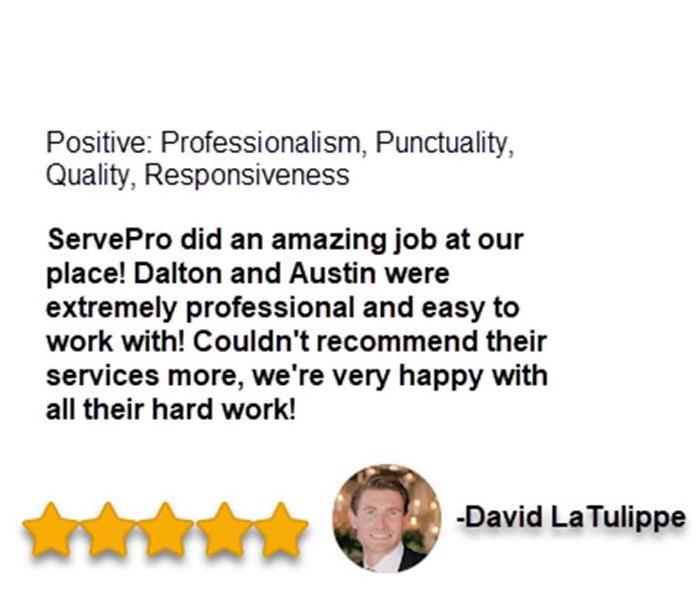 Google Review
Google Review
Water damage can occur for a variety of reasons, including heavy rain, burst pipes, and leaks.
When water damage occurs in your home or business, time is of the essence
Water damage should be cleaned up as soon as possible to prevent further damage and mold growth.
SERVPRO of Denver North is a water damage cleanup company that has the experience and equipment to handle any size water damage cleanup job. We are available 24/7 to help you with your water damage cleanup needs.
First, you will want to remove any excess water from the area. This can be done by mopping up the area or using a wet/dry vacuum.
Once you have removed as much water as possible, you will want to start the drying process. This can be done by opening up any windows and doors in the area to allow for air circulation.
You may also want to use fans or dehumidifiers to help with the drying process. Once the area is dry, you can start the process of restoring any damaged items.
This may include cleaning and disinfecting items, as well as repairing any damaged items.
There are a lot of steps involved and it takes time to do it right. Call SERVPRO we can help
Water Damage Insurance Details
9/16/2022 (Permalink)
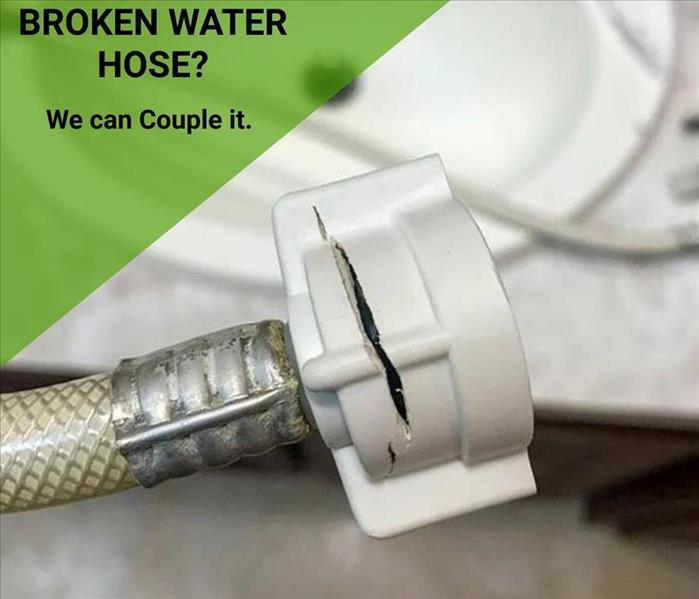 Little issues can become big problems, let us help
Little issues can become big problems, let us help
There are many factors to consider when it comes to determining water damage coverage, but it is also one of the most important parts of any homeowners’ insurance policy.
You can begin to understand why having the best possible coverage is so important when you consider that one out of every fifty homeowners will file a water damage claim each year.
Of course, the amount of your deductible will affect how much you’ll get in return, as that cost will come off the top of your claim.
Also, the type of your policy can affect how much you can get in a claim.
Cash value policies only guarantee the current value of your property, taking wear and tear into account, while a
Replacement value policy will give you the full amount of a new item.
While specific policy prices can vary from company to company, when asking how much is water damage insurance the answer can depend on certain steps you can take to help reduce your costs.
You should always shop around and never be afraid to ask any relevant questions so that you can compare each company’s prices and know exactly what you’re getting.
In many cases, you can also save yourself money in the long run by raising your deductible.
Since the amount you get from a claim can depend on how quickly you respond when disaster strikes, you can also help to save yourself money by hiring a professional water remediation company like SERVPRO.
Not only can SERVPRO address your water damage thoroughly with our trained professionals and high tech equipment, we can also help you file your insurance claim so that you can get the best possible result.
Who Should I Call for Water Damage to My Ceiling?
6/3/2022 (Permalink)
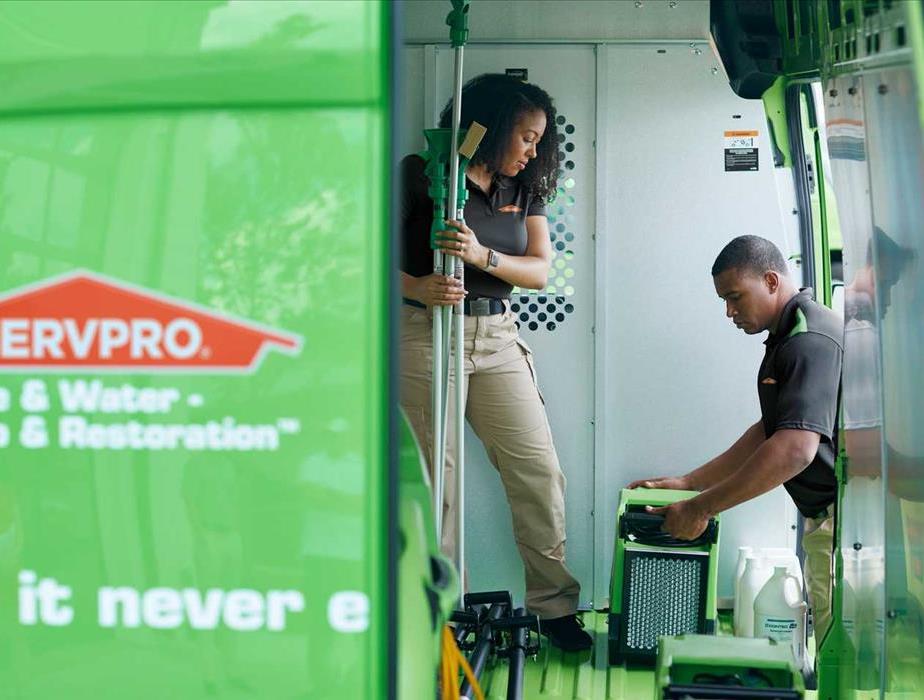 "Like it never even happened."
"Like it never even happened."
Nothing is as troubling as the sight of water leaking from your ceiling.
If you’ve got a leak, or just have discoloration, bubbling, or other damage to your ceiling without an active leak, you need to take action before the water damage gets any worse.
When you’ve got water damage who to call can be the most important question of all.
The statistics on water damage are eye-opening. According to the Environmental Protection Agency, leaks in the average household can account for nearly 10,000 gallons of wasted water every year (www.epa.gov/watersense/fix-leak-week), so even the most seemingly insignificant leak can eventually add up, and knowing when to call water damage professionals can make a huge difference.
So what do you do if you notice a leak or other water damage to your ceiling?
The common instinct for most people is to call their insurance company first.
Obviously, when you have water damage when to call insurance is an important question, but in most cases that shouldn’t be your first consideration.
Even the smallest amount of damage can be serious, as it may signal a much more widespread problem.
For that reason, your first thought when you experience water damage to your ceiling should be to address the underlying cause of the problem as quickly as possible.
The faster you stop the leak or otherwise cut off the water source, the better your chances of mitigating your expenses.
In particular, you need to know who to call for water damage in the ceiling, walls, and floors so that you can begin addressing water damage quickly in order to prevent the growth and spread of mold.
Mold can affect a number of surfaces, including drywall and ceiling tiles, and once it appears it can begin spreading within 24-48 hours.
With this in mind, the EPA suggests that certain actions, including removing and replacing damaged ceiling tiles, should take place within that period. (www.epa.gov/sites/production/files/2014-08/documents/table1.pdf)
First Call the Pros
It is important that any water damage is addressed by a professional remediation company that is equipped to handle the job thoroughly.
Companies like SERVPRO have the training and expertise necessary to identify potential problems and take the proper steps to make sure that they are adequately addressed.
Using specialized equipment such as moisture meters, infrared imaging devices, heavy-duty dehumidifiers, and fans, the professionals at SERVPRO can detect water issues, stop them at the source and thoroughly dry out all surfaces.
They’ll also perform complete mold remediation to ensure that all traces of mold and fungus are removed from your home.
When to File Your Claim
Insurance coverage for water damage can be a tricky proposition, as not all types of damage are covered by most homeowners’ policies.
You will undoubtedly want to contact your insurance agent once the immediate emergency has been addressed and when you do you should be sure to have all the necessary information at hand to help determine whether your damage is covered and how much money you’ll be able to recover.
Be sure to fully document every step of the process, including taking comprehensive before and after photos and keeping track of all of the bills for repairs and remediation.
The more evidence you can provide for your insurance agent, the better your chances of having a positive outcome for your claim, but it’s not guaranteed.
Most standard homeowners’ policies only cover damage that stems from sudden problems, such as a burst pipe, and they won’t cover damage that results from the gradual wear and tear that occurs over the life of your house.
So if the damage to your ceiling resulted from a worn roof that you failed to maintain, you’ll likely be out of luck.
Don’t Get In Over Your Head
While it can seem overwhelming, when there’s water damage ceiling who to call can be an important factor because having the right response can keep you from ending up in over your head.
The important thing is to take the damage seriously even if it seems minor. While some damage may only require a quick DIY project, more often it is just a signal of more extensive issues beneath the surface and you need to treat the whole thing to keep the damage from the building.
When water damage occurs to your ceiling, don’t hesitate to call in the pros
A professional water mitigation company like SERVPRO can keep your water emergency from getting out of hand and help return your home to its original condition so you can breathe easier.
With their extensive knowledge of the industry, they may even be able to help you file your insurance claim to improve your chances of getting positive results.
So don’t let a water-damaged ceiling drive you over the edge, rely on SERVPRO to get to the heart of the problem, and prevent mold growth.
When you have water damage who to call to prevent disaster can be the first step toward restoring your peace of mind.
Water-Damaged Wall in Berkeley?
12/7/2021 (Permalink)
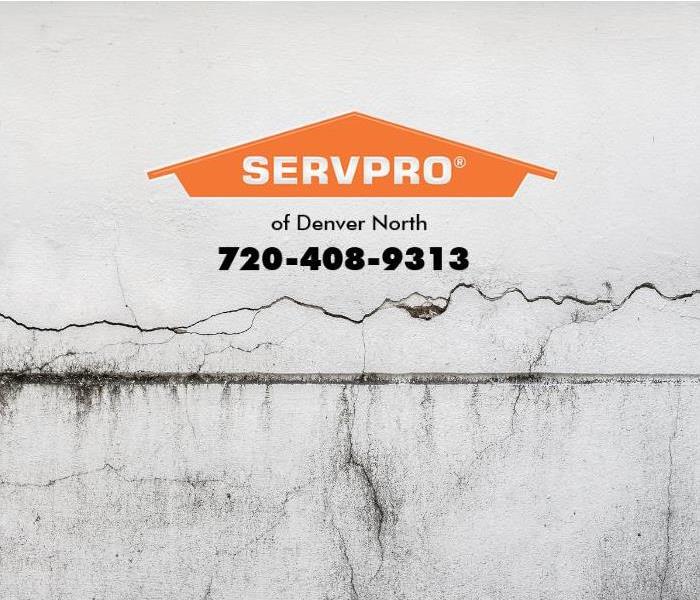 We are trusted leaders in water restoration in Denver.
We are trusted leaders in water restoration in Denver.
The lovely area of Berkeley and its proximity to Berkeley Lake Park make this a sought-after neighborhood. SERVPRO® of Denver North has been restoring water damage in Berkeley for many years. Our use of advanced technology saves our customers time and money! Here are some examples of the types of technology and equipment we use:
Moisture Detection and Measurement Equipment
Recent advances, like infrared cameras, help us detect water through a wall, ceiling, or floor.
- We use infrared cameras to identify water locations for thorough water removal
- Sensitive moisture detectors, hygrometers, and other meters measure the extent of moisture saturation
Water Extraction Equipment
- Submersible and gas-powered pumps for continuous pumping of high-level water
- Truck-mounted and portable extraction units perform efficient water removal
Drying Equipment
We use industrial-strength air movers and dehumidifiers to remove the remaining moisture from ceilings, walls, and floors. Proper drying helps to prevent swelling and warping of floors, walls, and furniture.
- High-speed air movers cause moisture to evaporate at a faster pace
- Industrial grade dehumidifiers pull the water vapor from the air
Call Us Today!
When your Berkeley home or business has a water damage emergency, SERVPRO® of Denver North has a team of highly trained technicians ready to assist you. Call us today at 720-408-9313.
Franchises are Independently Owned and Operated.
Damaged Pipes in Park Hill?
11/29/2021 (Permalink)
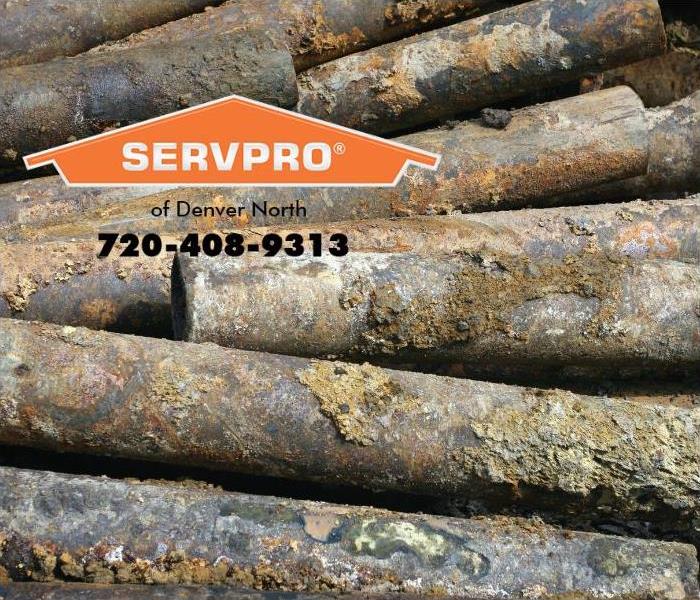 We are leaders in water restoration in Denver.
We are leaders in water restoration in Denver.
Park Hill is one of the oldest neighborhoods in Denver, and older homes carry the challenges of old cast iron or galvanized plumbing pipes. Over time, these types of pipes will corrode and fail. SERVPRO® of Denver North has been restoring water damage in Denver for many years.
Damaged Pipes
Check for cracks, bulges, water stains, and other signs of moisture on your ceiling or floors. If your water bill is increasing, you may have hidden water damage. Check crawl spaces, cabinets, and attics for signs of water damage, and insulate your pipes before winter begins.
To determine if you have hidden water damage, the Environmental Protection Agency suggests:
- A good method to check for leaks is to examine your winter water use. A family of four likely has a serious leak problem if its winter water use exceeds 12,000 gallons per month.
- Check your water meter before and after a two-hour period when no water is being used. If the meter does not read exactly the same, you probably have a leak.
Call Us Today!
When your Park Hill home or business has a water damage emergency, SERVPRO® of Denver North has a team of highly trained technicians ready to assist you. Call us today at 720-408-9313.
Franchises are Independently Owned and Operated.
Flooded Basement in Whittier?
11/3/2021 (Permalink)
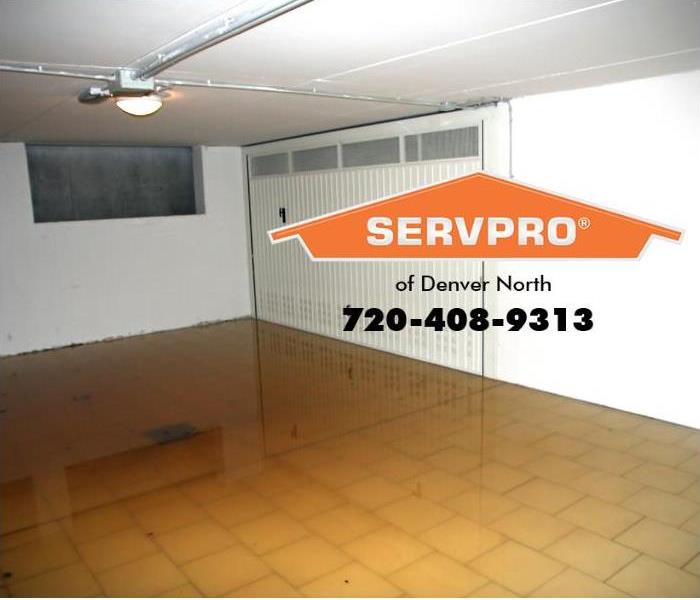 We are trusted leaders in water damage restoration in Denver.
We are trusted leaders in water damage restoration in Denver.
Whittier is one of the oldest neighborhoods in Denver, and as with most older homes, basement flooding can be an issue. SERVPRO® of Denver North responds to water damage emergencies throughout the year and offers these tips from the Insurance Information Institute for protecting your possessions from water damage.
Protect your possessions
- Store off-season and other bulk belongings in waterproof bins, especially in areas where there are plumbing pipes or that are prone to dampness, such as basements and attics
- Never store valuables or memorabilia where there is a risk of destruction from water. Water and dampness also bring with it the threat of mold damage.
- Keep belongings stored on shelving off the floor in basements. In case of water seepage or sewer backup, they’re less likely to get damaged.
- Keep an up-to-date home inventory. Having a comprehensive list of your possessions will save time, trouble, and stress in case of loss from water damage.
Call Us!
You never know when your Whittier home or business will need water damage restoration services, but when you do, SERVPRO® of Denver North has a team of highly trained technicians ready to assist you. We’ll clean and restore your water damage, “Like it never even happened.” Call us today at 720-408-9313.
Franchises are Independently Owned and Operated.
Flooded Floor in Denver?
10/4/2021 (Permalink)
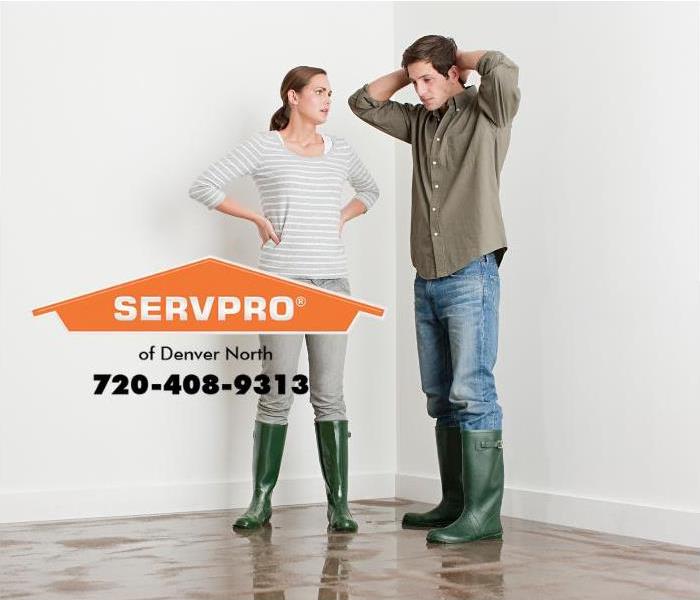 We respond to water damage emergencies 24-hours a day in Denver.
We respond to water damage emergencies 24-hours a day in Denver.
Water can cause serious damage to your Denver home or business in minutes. SERVPRO® of Denver North’s fast response time saves our customers time and money by minimizing the potential for further water damage. Here are some tips from our website on things you can do while waiting for help to arrive:
What To Do After Flooding
- Remove excess water by mopping and blotting
- Wipe excess water from wood furniture after removal of lamps and tabletop items
- Remove and prop wet upholstery and cushions
- Place aluminum foil or wood blocks between furniture legs and wet carpeting
- Turn air conditioning on for maximum drying in summer
- Remove colored rugs from wet carpeting
- Remove art objects to a safe, dry place
- Gather loose items from floors
What NOT To Do After Flooding
- Don't leave wet fabrics in place
- Hang furs and leather goods
- Don't leave books, magazines or other colored items on wet carpet or floors
- Don't use your household vacuum to remove water
- Don't use television or other household appliances
- Don't turn on ceiling fixtures if the ceiling is wet, and keep out of rooms where ceilings are sagging
Call Us Today!
When your home or business floods, and you need emergency water restoration services, SERVPRO® of Denver North can typically arrive within four hours of your call. Call us today at 720-408-9313. We’ll restore your water damage in Denver, “Like it never even happened.”
Franchises are Independently Owned and Operated.
Hidden Water Damage in Highland?
9/6/2021 (Permalink)
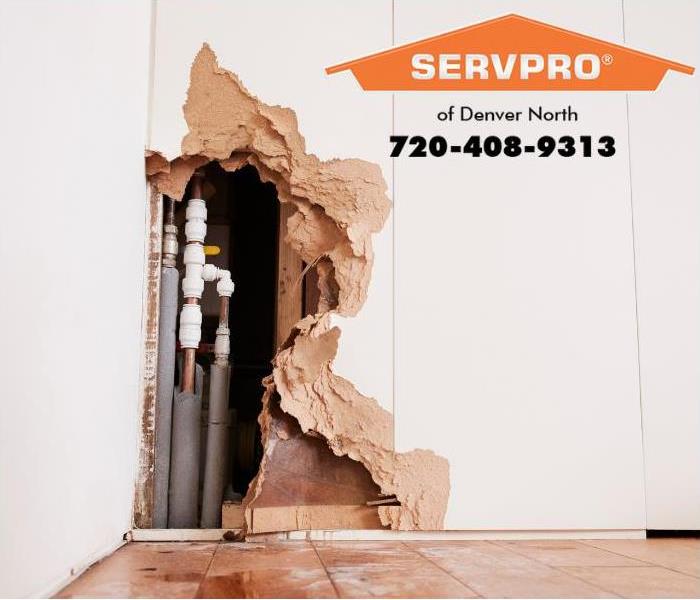 We are trusted leaders in water restoration services in Denver.
We are trusted leaders in water restoration services in Denver.
Water damage hiding in Highland home?
My water bill was too high, so I knew I had a water leak. I tried to locate the source of the leak, but I couldn’t find it, so I called SERVPRO® of Denver North. The SERVPRO team arrived quickly and assessed and inspected the home looking for leaks. They used moisture detection and moisture measurement equipment to monitor the property’s moisture levels. Once they found an anomaly in the moisture content, they brought out an infrared camera to identify the location of the water through the wall. Sure enough, water had been leaking inside my wall and had caused water damage to the insulation and wood frame. Fortunately, the technicians were able to restore the water damage, and now my water bill is back to normal!
Moisture Detection and Measurement Equipment
- Infrared cameras may be used to identify the water location for thorough water removal
- Sensitive moisture detectors, hygrometers, and other meters measure the extent of moisture saturation
Call Us Today!
SERVPRO® of Denver North technicians are on call 24-hours a day to respond to residential and commercial water damage emergencies. Call us today at 720-408-9313. We’ll locate and restore your hidden water damage in Highland, “Like it never even happened.”
Franchises are Independently Owned and Operated.
Denver Floods: Types of Flooding in Denver CO
9/4/2021 (Permalink)
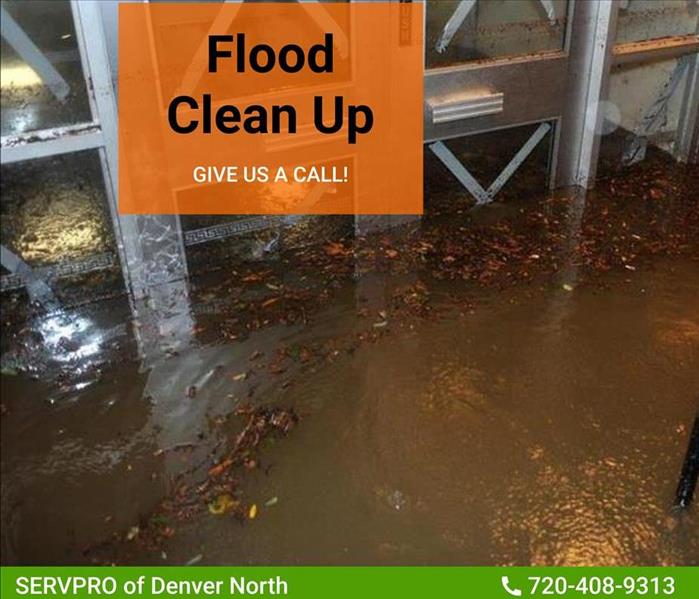 We can help with any flooding situation
We can help with any flooding situation
A flood is a type of natural disaster that causes severe flooding in low-lying areas and can occur anywhere, but typically occurs along coasts or rivers.
Flooding is usually contaminated with dirt and debris that seeps into homes as well as sewage and bacteria. The type of flooding that occurs depends on where the water is coming from.
Floods can be a huge problem in the Denver area, especially after an intense storm.
Flooding happens when water covers a large surface area and it comes from sources like rivers, streams, lakes or oceans.
Floodwaters can come from any natural or manmade source, and can be very damaging depending on the type of flood you have.
Floodwaters are divided into two categories: stationary floods and moving floods.
Moving Floods
A moving flood is a large volume of water that moves through an area at high speed like when a river gets out of its banks.
Floodwaters can be very dangerous because they may contain debris, chemicals and other pollutants.
Stationary Floods
A stationary flood is a large volume of water that covers an area like when rainwater collects in the ground or on top of buildings with nowhere to flow off to.
Floodwaters are not as fast-moving but still have the potential to be dangerous.
Floods are also caused by landslides, snow melts, dam breakage such as the case with Hurricane Harvey which was responsible for extensive flooding in Houston last year.
Floods are classified into two types: stationary and moving
Floodwaters can contain pollutants, debris, or chemicals that may be harmful to humans so it's important you have a Flood Cleanup Company come out right away.
We are proud to be the best flood clean-up and remediation company in the Denver area.
Our Flood and Water Damage Restoration Process
Since every flood and water damage scenario is a little different, each one requires a unique solution tailored for the specific conditions.
However, the overall water restoration process remains the same. The steps below detail our restoration process for the typical water-damaged property.
Step 1: Emergency Contact
Step 2: Inspection and Damage Assessment
Step 3: Water Removal/Water Extraction
Step 4: Drying and Dehumidification
Step 5: Cleaning and Repair
Step 6: Restoration
IICRC Training and Certification
We are IIRC trained and certified. The Institute of Inspection Cleaning and Restoration Certification (IICRC) certifies and sets the standards for the cleaning and restoration industries.
Our Professionals study IICRC standards and best practices in water restoration, fire restoration, mold remediation, carpet and upholstery cleaning, and other cleaning and restoration courses.
Let us help
https://www.SERVPROdenvernorth.com/contact/contactus
SERVPRO® of Denver North technicians are always on call 24-hours a day to respond to residential and commercial water damage emergencies.
Call us today at 720-408-9313.
Sewer Backup in Regis?
8/30/2021 (Permalink)
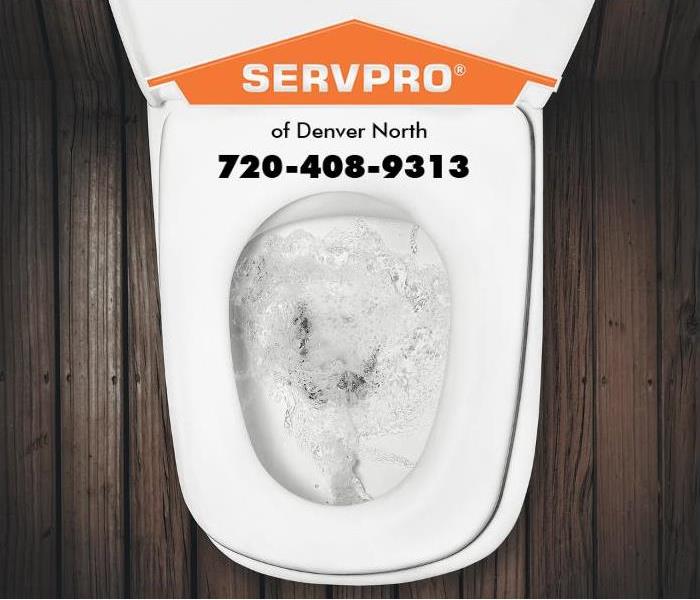 We are certified to mitigate dangerous black water sewer backups in Denver.
We are certified to mitigate dangerous black water sewer backups in Denver.
Regis residents need to know.
When your sewer backs up, you risk exposure to dangerous and grossly unsanitary water. Sewer water may contain dangerous bacteria and viruses that can cause serious illness. SERVPRO® of Denver North’s technicians are trained and certified to safely mitigate and restore sewer backups and toilet overflows Here are the three classifications for contaminated water:
Category 1: "Clean Water"
This is water from a clean source, such as a broken clean water supply line or faucet.
- If left untreated can degrade into category 2 or 3
Category 2: "Gray Water"
This water has a significant level of contamination that could cause discomfort or illness if ingested. Sources for category 2 water may include washing machine overflow, toilet overflow with some urine but no feces, or dishwasher overflow.
- It May contain bacteria and viruses
- Can quickly degrade into category 3 if left untreated
Category 3: "Black Water"
This water is grossly unsanitary and could cause severe illness or death if ingested. Any contact should be avoided.
- May contain untreated sewage, harsh chemicals, and microbes
- Water from flooding rivers or sewer backup
Call Us Today!
SERVPRO® of Denver North technicians are always on call 24-hours a day to respond to residential and commercial water damage emergencies. Call us today at 720-408-9313. We’ll restore your water damage in Regis, “Like it never even happened.”
Franchises are Independently Owned and Operated.
Water-damaged Bathroom in Whittier?
8/3/2021 (Permalink)
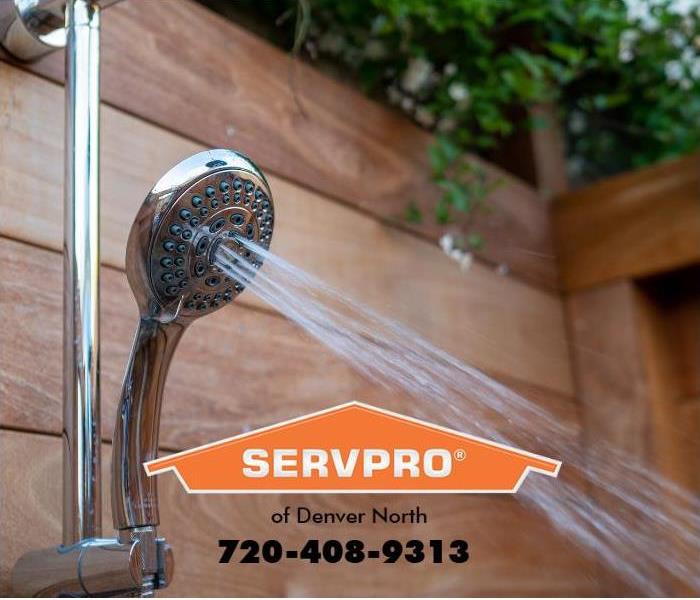 We respond to water damage emergencies 24-hours a day in Denver.
We respond to water damage emergencies 24-hours a day in Denver.
Vacation Washout in Whittier Home?
Over the years, SERVPRO® of Denver North has responded to all kinds of water damage scenarios. One Whittier family went on vacation for two weeks and came home to find the handheld shower wand had been left on the whole time they were gone, allowing the water to shoot up into the air and all over the drywall in the bathroom, causing severe water damage. Here are some tips from the Insurance Information Institute for inspecting indoor plumbing systems:
- Inspect appliance hoses and faucets. Immediately replace any hoses that have cracks or leaks and replace them all every five to seven years.
- Inspect showers and tubs. Check the seal and caulking around showers and tubs to make sure they are watertight and reseal if necessary.
- When away on vacation, shut off the water supply to the washing machine. Never leave the house while the washer or dishwasher is running.
- Know the location of the main water shut-off valve in your home
- Install an emergency pressure release valve in your plumbing system. This will protect against the increased pressure caused by freezing pipes and can help prevent your pipes from bursting.
- Check plumbing and heating pipes. Look closely for cracks and leaks and have any necessary repairs made immediately.
Call Us Today!
When your Todd Creek home or business needs water damage restoration services, SERVPRO® of Denver North is Here to Help. ® Call us today at 720-740-0182
Franchises are Independently Owned and Operated.
Dishwasher Flood in Welton?
7/5/2021 (Permalink)
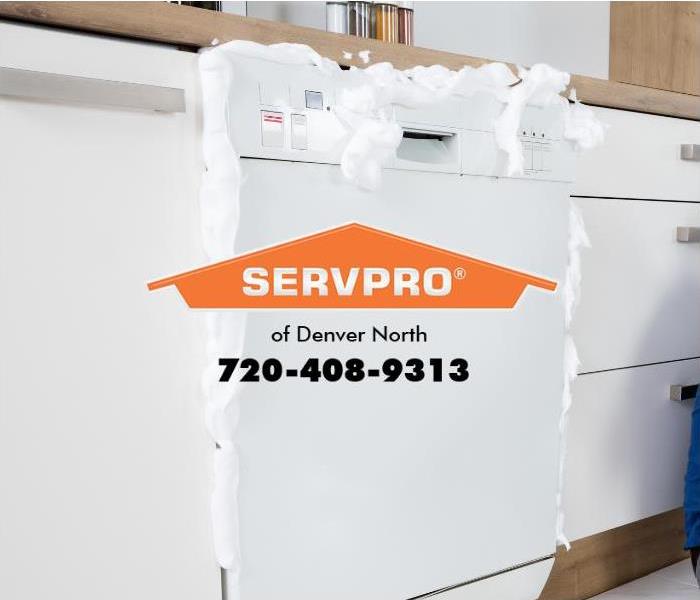 We are trusted leaders in water restoration services in Denver.
We are trusted leaders in water restoration services in Denver.
SERVPRO® of Denver North knows that water damage emergencies can happen at any time of the day or night in Welton, and when they do, we are Here to Help. ® Here are some water damage emergency tips from our website for things to do and not to do while waiting for help to arrive:
What To Do After Flooding
- Remove excess water by mopping and blotting
- Wipe excess water from wood furniture after removal of lamps and tabletop items
- Remove and prop wet upholstery and cushions
- Place aluminum foil or wood blocks between furniture legs and wet carpeting
- Turn air conditioning on for maximum drying in summer
- Remove colored rugs from wet carpeting
- Remove art objects to a safe, dry place
- Gather loose items from floors
What NOT To Do After Flooding
- Don't leave wet fabrics in place. Hang furs and leather goods
- Don't leave books, magazines, or other colored items on wet carpet or floors
- Don't use your household vacuum to remove water
- Don't use television or other household appliances
- Don't turn on ceiling fixtures if the ceiling is wet, and keep out of rooms where ceilings are sagging
Call Us!
Call SERVPRO® of Denver North today at 720-408-9313. We’ll clean and restore your water damage in Welton, “Like it never even happened.”
Franchises are Independently Owned and Operated.
Water Damage in Denver?
6/2/2021 (Permalink)
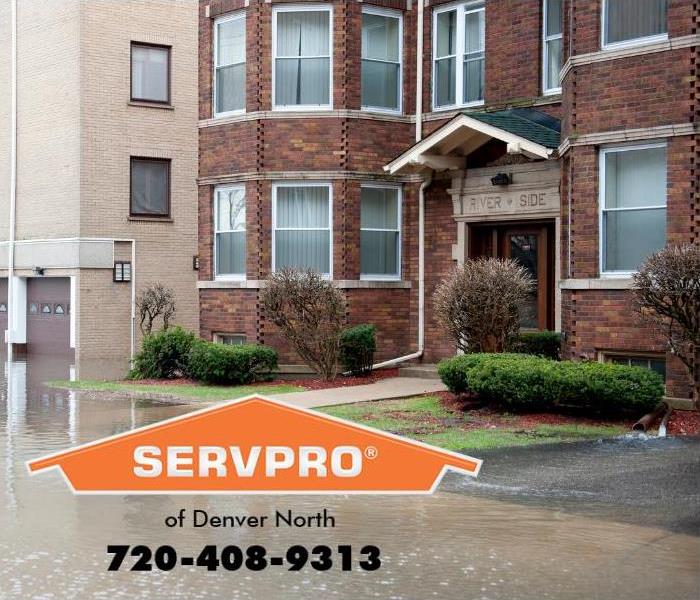 We mitigate water damage 24-hours a day in the Denver area.
We mitigate water damage 24-hours a day in the Denver area.
Water Damage Timeline for Denver
Water damage must be mitigated quickly to avoid more costly and time-consuming repairs. SERVPRO® of Denver North has a team of restoration technicians on-call 24-hours a day to assist you. Here is a water damage timeline from our website that shows the damage water can do over time:
Within Minutes
- Water quickly spreads throughout your property, saturating everything in its path
- Water is absorbed into walls, floors, upholstery, and belongings
- Furniture finishes may bleed, causing permanent staining on carpets
- Photographs, books, and other paper goods start to swell and warp
Hours 1 - 24
- Drywall begins to swell and break down
- Metal surfaces begin to tarnish
- Furniture begins to swell and crack
- Dyes and inks from cloth and paper goods spread and stain
- A musty odor appears
48 Hours to 1 Week
- Mold and mildew may grow and spread
- Doors, windows, and studs swell and warp
- Metal begins to rust and corrode
- Furniture warps and shows signs of mold
- Paint begins to blister
- Wood flooring swells and warps
- Serious biohazard contamination is possible
Call Us!
SERVPRO® of Denver North is ready to respond to your water damage emergency 24-hours a day, and we typically will arrive within four hours of your call. Call us today at 720-408-9313. We’ll restore your water damage in Denver, “Like it never even happened.”
SERVPRO® of Denver North is Independently Owned and Operated.
Sewage Back-up in Sunnyside?
5/3/2021 (Permalink)
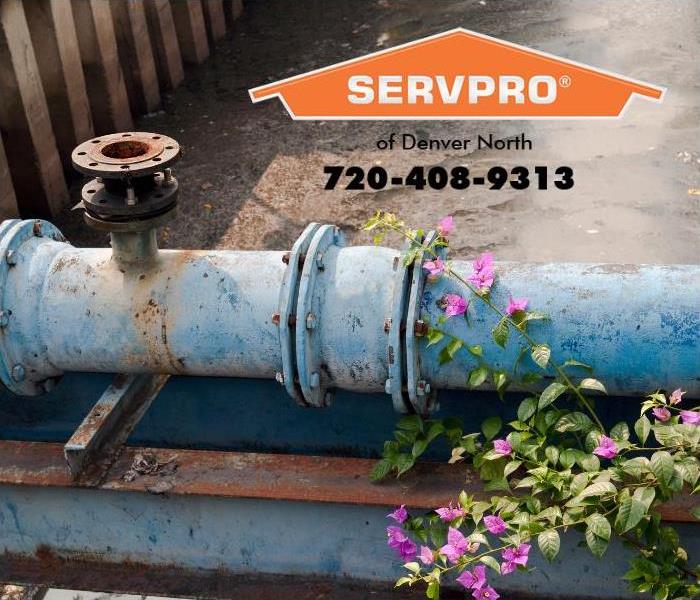 We respond to water damage emergencies 24-hours a day in Denver.
We respond to water damage emergencies 24-hours a day in Denver.
Did you know that SERVPRO® of Denver North has a team of water restoration technicians on call and ready to respond to sewer system backup emergencies 24-hours a day in Sunnyside? Sewer water is classified as “Category 3 Black Water.” Any contact should be avoided as this water is grossly unsanitary and can cause severe illness or death if ingested. Here are some tips from the Insurance Information Institute for preventing backups in your sewer lateral and in the city main:
- Properly dispose of grease
- Properly dispose of paper products
Paper towels, disposable, and cloth diapers, hygienic wipes and feminine products do not deteriorate quickly and can cause a great deal of trouble in the property owner's lateral as well as in the city main.
- Periodically cut tree roots
If you have continuing problems with tree roots in your lateral, you may have to regularly have the roots cut by a professional.
- Replace your line with new plastic pipe
Plastic pipe will prevent tree roots from entering your line is to replace your line and tap with new plastic pipe.
Call Us Today!
SERVPRO® of Denver North has a team of highly trained water restoration technicians on-call and ready to respond 24-hours a day to sewage backup emergencies in Sunnyside. Call us today at 720-408-9313. We’ll restore your sewer system damage, “Like it never even happened.”
SERVPRO® of Denver North is Independently Owned and Operated.
Water Damage in Whittier Business?
3/10/2021 (Permalink)
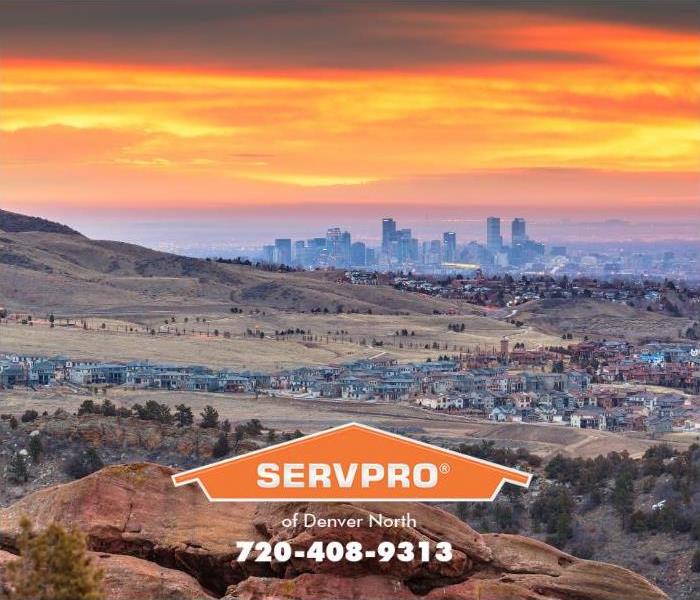 We mitigate water damage 24-hours a day in the Denver area.
We mitigate water damage 24-hours a day in the Denver area.
Wet in Whittier
When my Whittier vacation rental flooded, I panicked. I wasn’t sure what caused the flooding, and I couldn’t rent out the unit until the repairs were made to the plumbing and the unit was clean and water-damage-free.
I called SERVPRO® of Denver North, and they came out and immediately began the cleanup and restoration process. They extracted the water from the kitchen floor and then installed industrial-grade air blowers and movers to remove the room's excess moisture. Because they arrived and mitigated the loss so quickly, there was minimal damage, and no baseboards or flooring had to be replaced. They also supervised the replacement of the failed water supply line. Their quick work allowed me to rent the unit as planned with no rescheduling required!
Six-Step Water Mitigation Process
We follow a six-step process for most water damage scenarios as follows:
- Emergency Contact
- Inspection and Water Damage Assessment
- Water Removal and Water Extraction
- Drying and Dehumidification
- Cleaning and Sanitizing
- Restoration
Call Us Today!
SERVPRO® of Denver North has a team of highly trained water restoration technicians on-call and ready to respond 24-hours a day to water damage emergencies of any size in Whittier. Call us today at 720-408-9313.
SERVPRO® of Denver North is Independently Owned and Operated.
Rotten Roof in Regis?
1/25/2021 (Permalink)
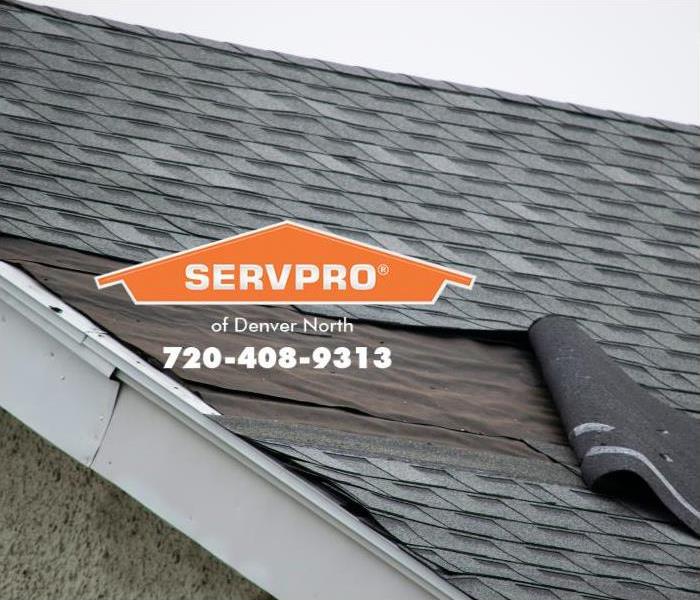 Denver area residents trust our water restoration technicians to get the job done right!
Denver area residents trust our water restoration technicians to get the job done right!
Climbing the roof over water damage?
Having roof damage during the winter months is very stressful, and sometimes this happens no matter how vigilant we are about routine maintenance and home inspections. The roof in this picture was damaged when a limb from a neighboring tree broke off during the last storm and damaged the roof. SERVPRO® of Denver North responds to all kinds of water damage scenarios throughout the year, and we offer these loss prevention and maintenance tips from the Insurance Institute for Business and Home Safety:
- Have a professional roof inspection done annually.
- Request a detailed inspection report that includes the condition of the flashing, roof covering, parapets and drainage system.
- Insulate the attic to prevent heat from entering the attic space.
Repair the roof as needed when there are signs of:
- Cracked or missing shingles or loose or missing granules.
- The flashing is deteriorated around chimneys and vents.
- Pooling water is present.
- In area prone to wind and hail, consider an impact-resistant roof covering that has passed the FM 4473 or UL 2218 standard.
Call Us!
SERVPRO® of Denver North is on-call and ready to respond 24-hours a day to water damage emergencies in the Regis area. Call us today at 720-408-9313.
SERVPRO® of Denver North is Independently Owned and Operated.
How to Repair a Burst Pipe
10/13/2020 (Permalink)
Bursting pipes can cause a lot of damage in a short amount of time, making them a scary issue for many homeowners. If your home in Denver, CO, is experiencing a pipe burst, chances are you will need to call a plumber to help resolve the issue. In the meantime, you can secure the leak using the following technique.
Fix Broken Pipe Using a Clamp and Sleeve
A clamp and sleeve kit can provide a temporary patch to stop the leak while you wait for remediation experts to arrive. Patch your bursting pipes using the following technique:
- Shut off the main water line. Use a metallic file or steel wool to smoothen any rough areas around the damaged section of pipe.
- Position the rubber sleeve so that it is centered over the burst. The clamp's seam should be facing the opposite direction of the break.
- Position the metal clamps around the rubber sleeve. Use a screwdriver to tighten the clamps.
- Reopen the water supply to the pipe. Watch carefully for any leaks.
The above technique should temporarily solve the issue while you wait for the plumber to arrive. If it doesn't fix the leak, simply repeat the process and reposition the clamp until it solves the issue.
Dry the Water
As soon as you stop the leak, you need to start drying the water. Standing water can quickly cause a lot of secondary damage, such as mold growth, so it's important that you act quickly. If the leak was small, you can resolve the issue by mopping up the water with a towel. Larger leaks that create a lot of water damage likely require professional assistance.
It's important that you take immediate action to fix bursting pipes as soon as you discover it. The subsequent water damage can wreck havoc on your home and cause several subsequent issues. Contact water remediation experts for help assisting with damage cleanup.
3 Parts To Check When a Commercial Toilet Keeps Running
10/2/2020 (Permalink)
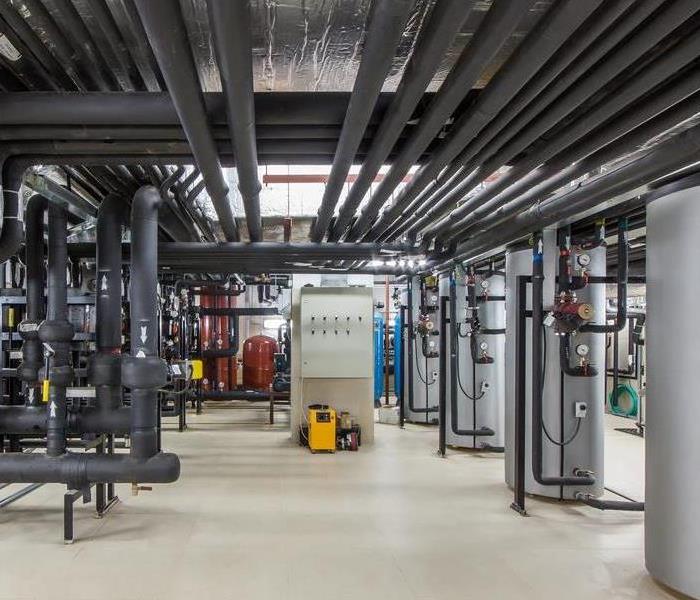 Being prepared is the best way to deal with damage.
Being prepared is the best way to deal with damage.
Your Denver, CO commercial building’s toilets need to run efficiently for the comfort of your employees and customers. However, when a plumbing issue like a toilet overflow happens, it can be unpleasant for everyone. This problem may be caused by a variety of issues, but some can be fixed without the assistance of a plumber. If a toilet keeps running, there are several parts you can check before you call in a flood damage and cleanup service to ensure your bathrooms are properly dried and deodorized after an overflow.
1. The Gasket
Once you turn off the water, the first step to take is to open the winter flushometer. This is the part that causes a commercial toilet to flush efficiently. Use a screwdriver and a wrench to remove this unit’s lid. The gasket is usually located directly under the lid. If it contains a lot of debris or buildup, carefully remove and clean the gasket thoroughly.
2. The Weep Hole
A commercial toilet’s weep hole controls its suction, so when it gets clogged, this may affect water flow and cause a continuous flush. When you remove the toilet’s gasket, take a close look at this small hole. Clean it carefully with a slim tool and ensure all the sediment and other debris is cleared out. This may stop a toilet from flushing constantly and prevent a future toilet flood.
3. The Flange Cover
If this part is loose or corroded, it may be affecting the unit’s proper operation and contribute to a toilet overflow. Note how much water you find under the cover. If there is enough to run over when you remove it, there may be a leak in the gasket or the cover might be faulty, and one or both could need replacing.
When your Denver, CO commercial building experiences a toilet overflow, it can be embarrassing and unpleasant. However, you may be able to repair it by checking and cleaning a few important parts inside the unit to prevent future floods.
How Water Affects Common Building Materials
9/10/2020 (Permalink)
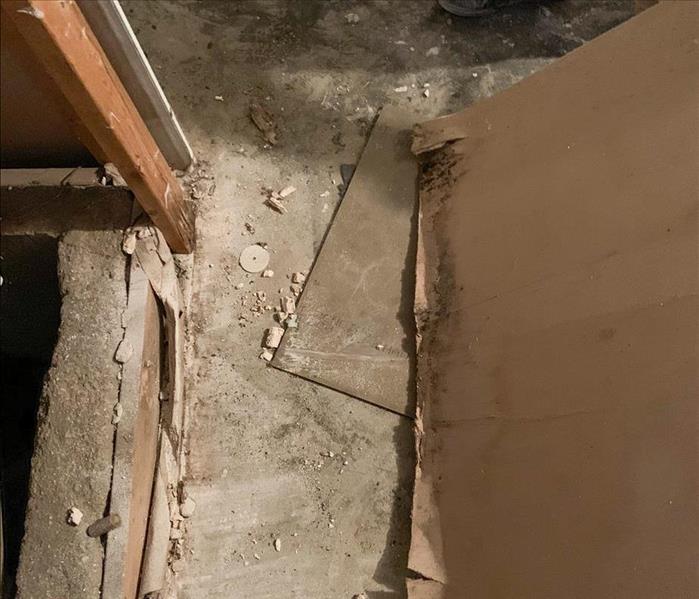 Water damaged materials removed from a wall
Water damaged materials removed from a wall
Large volumes of water can destroy your home’s internal structures. To minimize swelling wood and other forms of destruction, you need to quickly and efficiently remove standing water and eliminate moisture. Understanding how water destroys various building materials can also help you assess the salvageability of water-damaged items inside your home.
Dry-Soaked Objects
Eliminating water and moisture is one of the first steps of the cleanup process and is essential for damage control. You can utilize a variety of methods to expediate drying:
• Open windows
• Use fans and a dehumidifier
• Employ a shop vac to soak up pooled water
Wooden Materials
A common indication of water damage is swelling wood. Wooden structures inside your home that may be influenced by excessive water exposure include:
• Subfloors
• Baseboards and door frames
• Cabinets
When exposed to water, plywood may warp and delaminate. Particleboard can also bloat and distort. As a result, you may need to replace saturated subfloors. However, your ability to salvage wooden items will largely depend on the extent of water exposure.
Drywall Saturation
Both drywall and insulation absorb water. When saturated, drywall becomes soft and weak while insulation loses its R-value, thus reducing its effectiveness. Wet drywall and insulation can also become breeding grounds for mold and mildew. For this reason, saturated drywall and insulation should be promptly removed and replaced once the damaged area is dry.
Carpet Replacement
Like drywall and insulation, carpets and padding absorb water. Because wet carpets can also harbor mold and mildew, drying them quickly is essential. If the floor is extremely saturated, you may need to replace both items.
Professional Assistance
Every home in Denver, CO, is potentially susceptible to water damage. Removing standing water and quickly drying the area is crucial to minimizing destruction, including swelling wood. If your property suffers significant damage, you may want to hire a professional cleanup and restoration team. A licensed plumber can also inspect the water supply line, complete a water pipe repair to the damage and offer suggestions to minimize bursting pipes.
Are You Dealing With Category Two Water Damage?
9/10/2020 (Permalink)
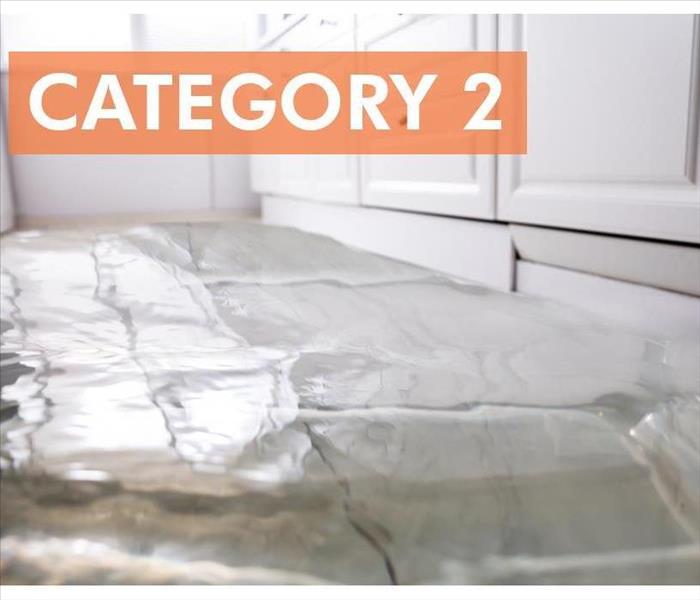 A spill from the dishwasher could be considered Category 2 water damage
A spill from the dishwasher could be considered Category 2 water damage
How To Classify Water Damage At A Commercial Property
The three most common sources of Category Two water damage are flooded toilets, leaking appliances, and plumbing problems that require water pipe repair. Gray water does not contain solid waste, but biological, chemical, and physical contaminants are probably present. Here are a few guidelines for classifying water damage at a commercial property in Denver, CO.
Contaminated Gray Water
Category Two water damage is less contaminated than Category Three damage but still requires sanitation during cleanup. Any of the following water systems have the potential to cause a Category Two leak:
- Building controls
- Dishwashing appliances
- Equalization tanks
- Handwashing sinks
- Laundry facilities
- Showers
- Toilets
The microorganisms present in Category Two water may pose health and safety risks to the occupants of any commercial building. If leaking or standing water contains chemicals or has been exposed to biological hazards, disinfection will be necessary.
Disinfection and Cleaning
Commercial- or consumer-grade disinfectants can be used to kill microbes and pathogens that pose health risks. Regularly maintaining appliances, building systems and plumbing reduces the risk of Category Two damage. It is unlikely that a broken pipe or incident that requires water pipe repair will cause this type of damage unless it involves a sewer line break or backup. Supply lines carry clean, treated water, and initially cause Category One water damage.
Drying and Prevention
It may be possible to accelerate drying with fans or a dehumidifier. After water damage is restored, it may be possible to prevent flooded toilets, which are a common source of Category Two damage, by posting signage in bathrooms about only flushing toilet paper and providing alternate disposal methods for sanitary products.
If you are not sure about the quality of water leaking or standing in a building in Denver, CO, arrange for damage cleanup professionals to inspect the property and water pipe repair. These specialists have experience in restoring water damage.
6 Helpful Hints About Filing a Water Damage Insurance Claim
9/2/2020 (Permalink)
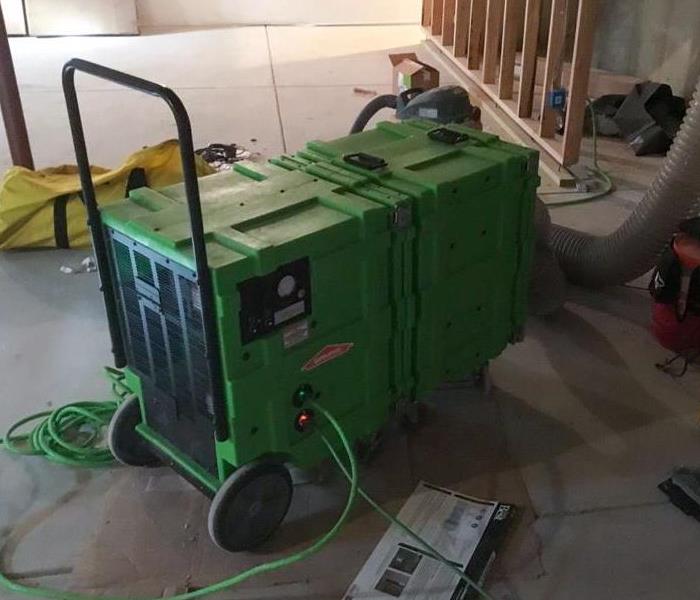 Water damage is no match for SERVPRO's drying system.
Water damage is no match for SERVPRO's drying system.
Insurance claims for water damage are on the rise. In fact, water damage claims are purportedly the second most reported petitions in Denver, CO. However, questions often arise when homeowners try to decipher the legal jargon of insurance policy, and many frequently become frustrated over exemptions and exclusions. Here are six hints to help you decode the steps you to take when making a water damage insurance claim.
1. Take pictures of the damaged area immediately after finding the water. Also, continue taking pictures during all stages of cleanup and restoration. If the damage is due to a pipe burst, take pictures of the pipe as well. Offer a copy of all photos to the insurance adjuster.
2. Contact your insurance agent regarding the loss. Ask the agent questions about your coverage, the time limit to file a claim, and deductibles. Request information on repairs, restoration, and how long a claim takes to process.
3. Establish your claim by filling out the claim forms as soon as you receive the papers. Return the completed documents to the insurance company right after you finish the paperwork.
4. Keep a list of damaged and lost items. Include all steps taken to clean or discard major items, if possible. Also, take pictures and keep the photos with the records to substantiate the loss. If receipts are available for destroyed or damaged items, provide copies with your insurance claim.
5. Request receipts and a detailed list of all work done by your water repair and restoration company. Also, ask the team to include a list of all supplies used to clean and sanitize the area.
6. If your family needs to relocate during cleanup and restoration, keep receipts. Extensive records required may include living expenses, replacement clothing, and meal expenditures.
Once your insurance claim has been settled, and the insurance company accepts your submission, a payment is typically sent to cover the terms of the settlement. If the claim is refused, you have the right to contest the refusal and the right to hire an attorney.





 24/7 Emergency Service
24/7 Emergency Service






















